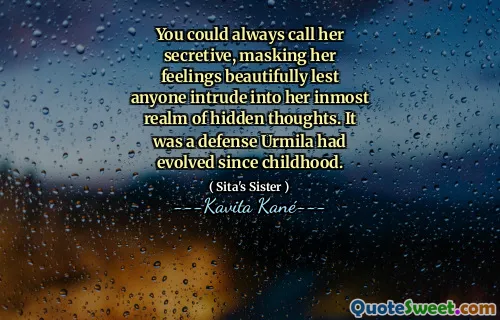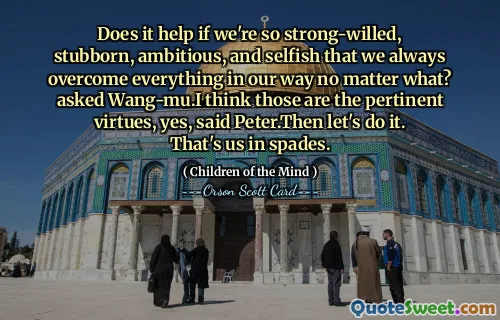
You could always call her secretive, masking her feelings beautifully lest anyone intrude into her inmost realm of hidden thoughts. It was a defense Urmila had evolved since childhood.
Urmila’s behavior of masking her feelings is a powerful testament to the ways individuals develop defense mechanisms in response to their early life experiences. Throughout the narrative, her secretiveness is portrayed not merely as a personality trait but as a shield she has honed over the years to protect her innermost thoughts and emotions. This tendency to hide one’s true feelings resonates with many who have faced situations where vulnerability felt unsafe. The metaphor of her 'inmost realm' emphasizes the depth of her inner world, which she chooses to guard vigilantly against intrusion. Such behaviors could arise from various motivations—perhaps fear of judgment, past trauma, or a desire for autonomy. Her evolution from childhood suggests a gradual adaptation, a survival strategy crafted early on that has persisted into adulthood. This kind of emotional self-preservation, while shielding her from potential harm, also isolates her, creating a complex dynamic where she may struggle to trust others or form intimate connections. It raises broader questions about the nature of authenticity and the human tendency to construct emotional barriers as armor. Recognizing such patterns in characters like Urmila allows us to understand the delicate balance between self-protection and openness in human relationships. Her secretiveness is both a defensive act and a reflection of her resilience, demonstrating how individuals adapt psychologically to navigate a world where vulnerability might be perilous. Ultimately, her silent strength underscores the multifaceted nature of human emotion—how concealment can be both a source of pain and a means of survival, highlighting the profound intricacies of personal resilience and emotional depth.





